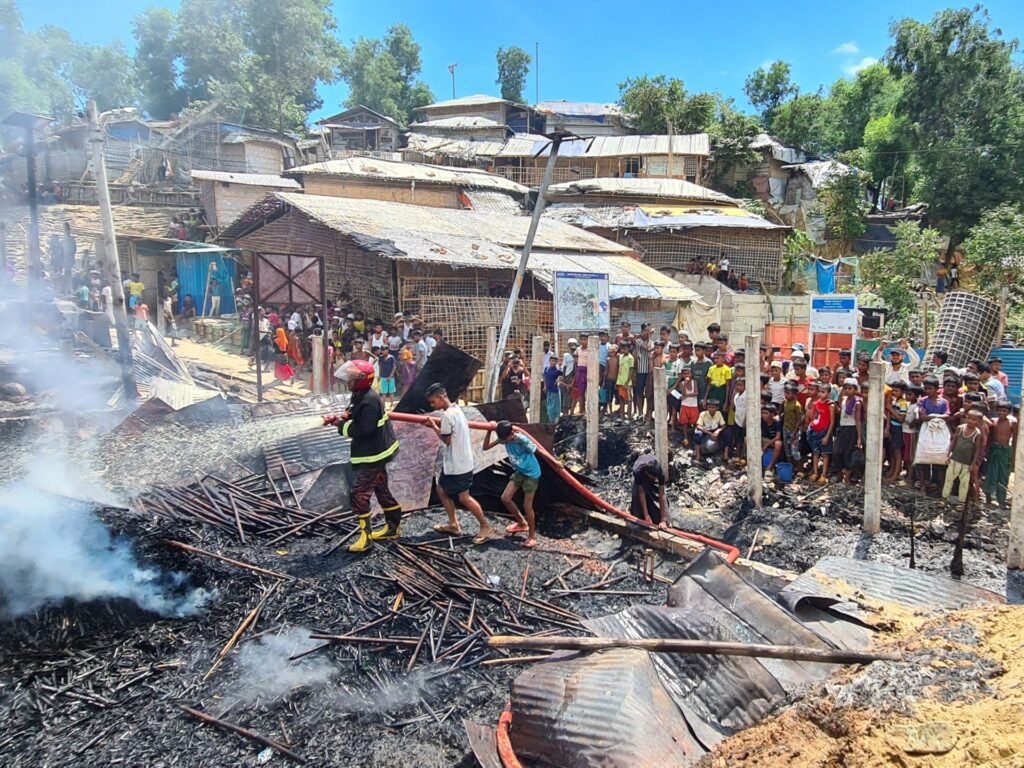The United Nations has issued a warning that escalating violence in Myanmar’s Rakhine State has led to another 45,000 Rohingya minority members fleeing amid allegations of beheadings, killings, and property burnings. The conflict began when the Arakan Army rebels attacked the ruling military government forces in November, ending a ceasefire that had been in place since a military coup in 2021. This has put the Muslim minority group in the middle of the fighting, as they have long been considered outsiders by the majority Buddhist residents.
The Arakan Army is fighting for more autonomy for the ethnic Rakhine population in the state, where an estimated 600,000 Rohingya Muslims also reside. Many Rohingya have sought refuge in neighboring Bangladesh, with over a million fleeing Rakhine, including hundreds of thousands in 2017 during a military crackdown that is now the subject of a United Nations genocide court case.
Tens of thousands of civilians have been displaced in recent days due to fighting in Buthidaung and Maungdaw townships, with 45,000 Rohingya reportedly fleeing to an area near the border with Bangladesh. The UN has called for the protection of civilians according to international law and urged countries to provide effective protection to those seeking refuge.
The situation on the ground is dire, with reports of beheadings, killings, and villages being burned. Survivors have described fleeing from Buthidaung, only to be blocked by the Arakan Army on the road to Maungdaw. The Rohingya are caught in the middle, with both the Arakan Army and the military recruiting them to fight or threatening to burn their villages if they refuse to join.
The international community is being called upon to support Bangladesh in hosting Rohingya refugees and to ensure that the rights of those seeking protection are upheld. The situation remains volatile, with no immediate end in sight to the violence and displacement in Rakhine State.
#Rohingya #flee #allegations #beheading #burning #Myanmar
Analysis of the Situation
The escalating violence in Myanmar’s Rakhine State, particularly affecting the Rohingya minority, is a grave humanitarian crisis that requires immediate attention. The recent exodus of 45,000 Rohingya, amid allegations of beheadings, killings, and property burnings, highlights the dire situation faced by this marginalized community.
The conflict between the Arakan Army rebels and the ruling military government has further exacerbated the plight of the Rohingya, who have long been discriminated against in Myanmar. The lack of autonomy for the ethnic Rakhine population, coupled with the presence of a significant Rohingya population in the state, has created a volatile situation where civilians are caught in the crossfire.
The displacement of tens of thousands of Rohingya, with reports of entire towns being burned and civilians facing abuse and extortion, paints a grim picture of the atrocities being committed in the region. The beheadings and other human rights violations documented by the UN rights office highlight the urgent need for international intervention to protect vulnerable populations.
Long-Term Implications and Future Developments
The long-term implications of the ongoing conflict in Rakhine State are deeply concerning. The continued displacement of Rohingya, coupled with the lack of effective protection for civilians, raises fears of further human rights abuses and loss of life. The Rohingya refugees in neighboring Bangladesh, already facing challenges, are likely to bear the brunt of the latest exodus.
Future developments in the region will depend on the response of the international community and the actions taken by the Myanmar government, the Arakan Army, and other relevant stakeholders. Efforts to provide humanitarian aid, protect civilians, and address the root causes of the conflict will be crucial in shaping the outcome of the crisis.
Actionable Advice
Based on these insights, it is imperative that immediate action be taken to protect the Rohingya population in Rakhine State and provide assistance to those fleeing the violence. Key recommendations include:
- Increasing humanitarian aid to support displaced Rohingya and other affected populations
- Calling for a ceasefire and peaceful resolution to the conflict through dialogue and diplomacy
- Ensuring accountability for human rights violations and promoting justice for victims
- Supporting efforts to address the root causes of the conflict, including discrimination and lack of autonomy
- Urging Myanmar and other relevant parties to uphold international law and protect civilians from harm
By taking these actions and advocating for the rights of the Rohingya and other vulnerable populations in Rakhine State, we can work towards a more peaceful and just future for all affected by the conflict.

